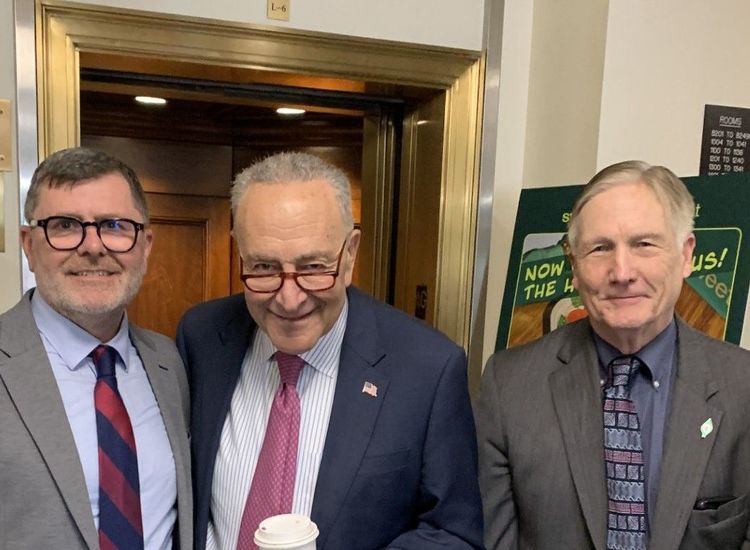Little Elie Madden will probably have no memory of the flight, but she will have innumerable future memories because of it.
The year-old tot was flown to Boston from Dublin this week for treatment at Boston Children's Hospital, this for a rare medical condition that has made her first year of life about as difficult as one can imagine.
Elie and her family arrived in Boston's Logan airport Monday on board an Air Corps Gulfstream jet which had taken off just a few hours earlier from Baldonnel outside Dublin.
Elie is a twin. Her sister Emie is healthy. Elie, by contrast, now faces complex treatment because her Oesophagus is not connected to her stomach. The medical term for her rare condition is Tracheo-Oesophageal Fistula with Long Gap Oesophageal Atresia.
This means she cannot swallow and is facing all manner of complications as a result. Elie, who was born premature, also suffered complications with her Aorta, but doctors in Ireland cured the problem.
Elie will receive her treatment in Boston's Oesophageal Advanced Treatment Center which uses the Foker technique. This procedure, if successful, will allow Elie's oesophagus to be repaired rather than replaced.
The procedure is the closest thing to a full cure and will give Elie a quality of life that has thus far eluded her.
Elie could not fly on a commercial plane. So the Air Corps stepped in with its air ambulance service.
Elie's dad, Eddie, is a Dublin native. Her mother, Esti, is Polish. The Maddens live in the Dublin suburb of Glasnevin.
"Elie can't take a normal commercial flight because of all the equipment she needs to be able to breathe and eat. We will have her doctor, nurse, carer and a technical engineer on board as well," Eddie Madden told reporters before the flight.
The family has set up a website, www.eliemadden.com, which explains Elie's condition, and what is needed for successful treatment.
Elie and Emie were born by emergency caesarean and Elie had to spend the first nine months of her life at Our Lady's Children's Hospital in Dublin.
She constantly has a tube in her throat to stop her trachea collapsing and is fed through a peg into her stomach. She regularly needs a ventilator to clear her airways, and has undergone a number of heart operations.
He's in regular e-mail contact and when in L.A. meets them for breakfast or a meal or a beer.
"We go to baseball games together," Connelly said.
It was a cop in another era, however, from whom he learned something more central than the facts. The best-selling author wrote two crime novels in his 20s, but even his wife hasn't read those trial runs and he never sent them out. Something was missing, and he realized he'd stumbled upon it while working on a story about a homicide squad for his South Florida newspaper.
At a crime scene, the detective he was shadowing, Sgt. Hurt, always took time to squat down next to the body. At such moments, he would put the earpiece of his glasses in his mouth. Connelly didn't know what it meant, but it was apparent that the detective took the murders personally in some way.
Some of the cases required Hurt work through the night and he was exhausted when the young reporter went to thank him for allowing him to tag along for the week. The detective took off his glasses behind his desk and rubbed his eyes.
"I could see that there was a deep groove in the plastic earpiece and that was a killer moment, a very telling moment, a moment I had to have seen," Connelly said. "I suddenly realized that his teeth were clenched so tight studying these victims that he was cutting into his glasses.
"I knew there was a lot of internal world there, a lot of internal things going on," he continued. "And in my first efforts at writing novels that's what I was missing - the internal world, the internal cost.
If your job takes you to the dark corners of humanity, murder scenes, how do you keep any of that darkness from getting inside of you."
Connelly quoted veteran novelist and former LAPD officer Joseph Wambaugh as saying that "stories are not about how cops work on cases, but on how cases work on cops."
"That's kind of what I saw in that week," he added.
He said of Bosch, a Vietnam War veteran and long-time detective: "He's pretty much relentless as a bullet when it comes to his mission. At the moment, his mission is to solve all murders that were given up on.
"He's a kind of a court of last resort for victims, and I think in a way he revels in that. He has this ability to make cases personal, if they're not. The key for him as a detective is to get angry about cases and that gives him the juice he needs to be relentless to carry out the mission," Connelly said. "He'll find the little thing that gets under his skin, that makes it personal. And he does this knowingly. It's not subconscious. He knows he's got to start a fire somehow and he looks for it in each case."
Family ties
Bosch has not been lucky in love nor been particularly happy in general. "It really seems like I've been torturing the guy for 20 years," the author said.
"You have to have a character who has conflicts, who has flaws, who has obstacles," he said. "If he's fulfilled by life, he's not going to be as interesting."
But things are getting better for his detective. For one thing, he has another important mission: caring for his teenage daughter, who had lived apart from him in her earlier years.
The author is clearly not much like the loner Hieronymous Bosch, named at birth for the Dutch painter who dealt in themes of sin and redemption. Connelly was born in 1956, the second of what would eventually be six children. His mother was a homemaker and his father a builder, like his father before him. During an economic downturn, his father moved the family to South Florida, where he found work in property development. Michael was 12 at the time. The Connellys were the only branch of the extended family to leave Philadelphia. The author still has 25 cousins in the city.
He was educated at Catholic schools, except for one year. The family's sense of its Irish identity was, he said, "I think pretty typical." All eight of his great-grandparents, were Irish immigrants, most of them from Cork. "I've not been back there myself, but a lot of my brothers and sisters have," said Connelly, who was in Eason's of O'Connell Street in Dublin to sign books earlier this month.
The Connellys, whose parents are deceased, are now scattered around America. One works for the writer, managing his Web presence, and the others have made their way in a variety of professions. They live in Seattle, Boston, Nashville, Colorado and Chicago.
Last week, they all gathered with their spouses and children and other relatives in Siesta Key, Fla., as they have done for each of the last 12 Thanksgivings.
Connelly lives an hour and a half away with his wife and their 14-year-old daughter.
Being a father, he said, "makes you more hopeful for a better world because you're going to leave somebody behind. That kind of carries over into my fictional world."
He's not sure where publishing is going, though. "I'm a story teller. The story is not in danger. It's just how the story is delivered. And that's obviously changing very quickly," he said.
Connelly's e-book sales have gone from zero to 50 percent in just five years. "I hope we can have both," he said. "It would be awful if we lived in a place without book stores."
He believes it's important to be able to "discover stuff on your own in a book store or a library."
Critical respect
Connelly's demeanor is low-key and his manner friendly. He said he doesn't believe there's anyone luckier than him on Earth.
"I wanted to be a writer. That was my goal. I didn't then think in terms of what writing could bring me," he said, referring to the trappings of success, which include an apartment overlooking New York's Central Park. "You never think about that stuff. You think about writing stories and characters, and hopefully keeping them alive
"I've been lucky that the characters than I've wanted to continue to write about, people respond to them," said the author, whose literary hero is Raymond Chandler. "So it works that I get to keep coming back to someone like Harry Bosch. It's an amazing gift that I've been given."
By "gift," Connelly was referring less to his own talent than to the signature character he hopes will keep on giving even after he must inevitably retire from the LAPD. To that end, he has been researching Los Angeles in the early 1970s and has talked to cops from that era.
But talent he certainly has, according to Joyce Carol Oates, one of the nation's most prolific authors and literary critics.
"It means a lot to me.
I assume it helps," Connelly said. "The thing with
Joyce Carol Oates was quite amazing because she is a highly respected writer, someone I respect, and when she
has a point of view, it makes people look at it and think about it. That she would acknowledge the work of a some crime writers, myself included, is just a fantastic thing."
On one Youtube video, he is introduced to a 2009 conference as "America's greatest crime writer." In response, Connelly asks jokingly if the guy could open all of his book-tour events. But when interviewed, he put the MC's comment down to "hyperbole" in public settings.
"You've just got to keep your head down and not worry about any that," Connelly said. "All those accolades are great, but when it's time to sit at the computer and write something it doesn't really help you."










